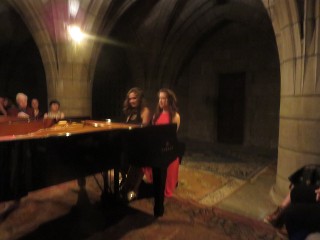|
Back
Chords in the Catacombs New York
Crypt Chapel, Church of the Intercession, 155th Street, New York
08/25/2016 -
Olivier Messiaen: Visions de l’Amen
Christina and Michelle Naughton (Pianists)

M and C. Naughton in The Crypt (© Samuel T. Dog)
A church crypt is possibly the least appropriate place to perform the music of Olivier Messiaen. His compositions, like his deepest beliefs were neither dank nor gloomy. Shying away from even a hint of the charnel house, his works soared with ravishing colors, with the songs of birds, with the most sensuous, sexual love. Even the agonies of the Christ were transmuted into music which–like John Eliot Gardiner’s credo on J.S. Bach–could not help but dance.
The crypt would be appropriate for Dufay or Dante or Dostoyevsky. Messiaen’s music was as life-affirming as Marc Chagall.
Yet the crypt of the soaring Church of the Intercession did serve as the concert hall to those glorious duo-pianists, Michelle and Christina Naughton. So, after a stroll from a church corridor to the cemetery and the gardens, we descended to this New York ossuary (devoid of bodies), a Gothic reminder of the Age of Belief. And while this writer might have been disconcerted, both by the setting and by having to stare over the two pianos to the other half of the audience, both Messiaen and the Naughton twins resurrected Messiaen’s creation to whatever heavens might exist on West 155th Street.
While Messiaen’s Visions on the Amen was an early piece, his emotional beliefs never changed over the years. The seven movements on the “Amen” were charged with the spiritual and the secular. For in Messiaen’s mind, God’s universe contains infinite combinations of both.
And when Christina and Michelle Naughton began with a simple blurry cosmos for the “creation” Amen, and Christina’s medieval chords broadened up from the depth, with unexpected variations on the second piano, the cosmology of Messiaen’s music never stopped.
Neither pianist used a score, nor did they signal to each other during the 50-minute performance. Nor did their faces reflect a particular religiosity. Rather, they reflected the diversity of Messiaen’s music. The loveliness of the birdsong trills, the hammering of “justice” (albeit a rather soft thudding, hardly Inquisition style), the whirling of the planets, and the final “Consummation”, a piece with as many tintinnabulations and gongs and echoes on the two Yamahas as Ravel ever added to Mussorgsky’s Pictures.
One heard echoes of other pieces–notably the Turangalîla-Symphonie in The Amen of Desire. But in Messiaen’s terms, this was not quotation, it was simply another variation on the universal theme of sensuosity. What could have been brutality in the Stars and the Ringed Planet became, under the 20 fingers of the Naughtons, a kind of amiable chase, God’s handiwork as told by an agnostic astronomer as cosmic game.
In fact, the Naughtons gave such a diversity to this music–nearly all of which was written in the same key, A–that one never felt that this was a “long” or monotoned experience.
In a way, outside of the crypt-ic atmosphere, I would have preferred a concert stage. There, one might have felt the physical distance allowing the music to stand by itself. Here, in these catacombs, one felt far too involved, watching every finger, every facial expression. It became–no fault of the Naughtons, who disguised their technical expertise–an all too human concert played by two extraordinary humans. What could have been–should have been–the mysticism of music became a secular wonderment and joy.
In most cases, I would have rebelled inwardly that they needed to play an encore, that even this Bach would have broken the spell. But the spell in this case was a joy at the music, not the message. Physically, the Messiaen had lasted close to an hour. Metaphysically, Messiaen’s substance was a fraction of a second. Philosophy, though, had little to do with this performance. The infinity of Messiaen’s ideas were–not unhappily–enclosed into one terrific temporal performance.
Harry Rolnick
|